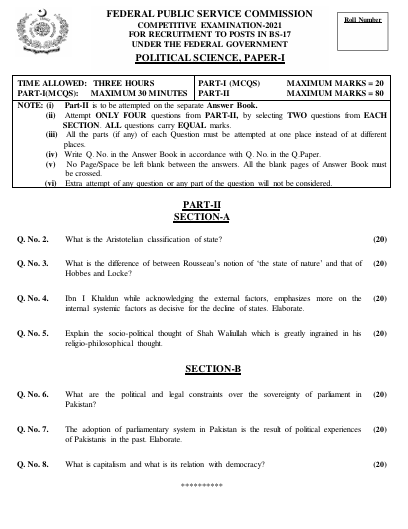Table of Contents
ToggleCSS Political Science Paper 2021 (I)
SECTION-I
Q. No. 2 What is the Aristotelian classification of state? (20 marks)
Q. No. 3. What is the difference between Rousseau’s notion of the state of nature and that of Hobbes and Locke? (20 marks)
Q. No. 4. Ibn I Khaldun while acknowledging the external factors, emphasizes more on the internal systemic factors as decisive for the decline of states. Elaborate. (20 marks)
Q. No. 5. Explain the socio-political thought of Shah Waliullah which is greatly ingrained in his religio-philosophical thought. (20 marks)
SECTION-II
Q. No. 6. What are the political and legal constraints over the sovereignty of parliament in Pakistan? (20 marks)
Q. No. 7. The adoption of the parliamentary system in Pakistan is the result of the political experiences of Pakistanis in the past. Elaborate. (20 marks)
Q. No. 8. What is capitalism and what are its relations with democracy? (20 marks)
Summary:
SECTION-I
Q. No. 2. What is the Aristotelian classification of state?
Summary: This question asks for an explanation of Aristotle’s classification of states. Aristotle categorized governments based on the number of rulers and the pursuit of the common good. He identified three “correct” forms of government: monarchy (rule by one for the common good), aristocracy (rule by few for the common good), and polity (rule by many for the common good). Conversely, he described three “deviant” forms: tyranny (corrupt monarchy), oligarchy (corrupt aristocracy), and democracy (corrupt polity), where rulers prioritize their own interests over the common good. The question expects an in-depth analysis of these classifications and their significance.
Q. No. 3. What is the difference between Rousseau’s notion of the state of nature and that of Hobbes and Locke?
Summary: This question asks for a comparison of Rousseau’s state of nature with those of Thomas Hobbes and John Locke. Rousseau believed that humans were naturally good and that society and private property corrupt them, while Hobbes saw the state of nature as a chaotic and violent “war of all against all,” necessitating a strong authoritarian state. Locke, in contrast, viewed the state of nature as a state of equality and freedom, where individuals had natural rights to life, liberty, and property, and formed governments to protect those rights. The question calls for a comparison of these different philosophical perspectives on human nature and the justification for political authority.
Q. No. 4. Ibn Khaldun, while acknowledging the external factors, emphasizes more on the internal systemic factors as decisive for the decline of states. Elaborate.
Summary: This question requires an exploration of Ibn Khaldun’s theory on the decline of states. While recognizing the role of external factors, such as invasions and natural disasters, Khaldun emphasized the importance of internal systemic factors like political corruption, economic decline, and the weakening of social cohesion (Asabiyyah) as key drivers in the collapse of states. The question asks to elaborate on how these internal dynamics, such as the erosion of leadership and loss of unity, contribute more significantly to the decline of a state than external threats alone.
Q. No. 5. Explain the socio-political thought of Shah Waliullah, which is greatly ingrained in his religio-philosophical thought.
Summary: This question asks for an explanation of Shah Waliullah’s socio-political thought, rooted deeply in his religious and philosophical beliefs. Shah Waliullah was an influential 18th-century Islamic scholar who advocated for a synthesis of Islamic teachings with social reform. He believed that the state should be based on Islamic principles, and emphasized the need for justice, unity, and moral governance. His thoughts on governance were closely tied to the idea of a divinely guided political system, which promoted social welfare, economic justice, and the strengthening of Islamic institutions. The question requires an analysis of how these religious ideas shaped his views on politics and governance.
SECTION-II
Q. No. 6. What are the political and legal constraints over the sovereignty of parliament in Pakistan?
Summary: This question explores the political and legal limitations on the sovereignty of parliament in Pakistan. While Pakistan’s constitution grants parliamentary sovereignty, there are several constraints that limit its power. These include judicial review by the judiciary, which can strike down laws deemed unconstitutional, the influence of the military, and the role of the executive, especially the president. Additionally, political factors, such as party politics and coalition politics, also impact the functioning and decisions of parliament. The question requires an analysis of these factors and how they affect parliamentary sovereignty in Pakistan.
Q. No. 7. The adoption of the parliamentary system in Pakistan is the result of the political experiences of Pakistanis in the past. Elaborate.
Summary: This question requires an explanation of how Pakistan’s adoption of a parliamentary system was influenced by its historical and political experiences. After gaining independence, Pakistan faced political instability and struggled to establish a stable governance structure. The parliamentary system, modeled on the British system, was adopted as a way to ensure greater representation and accountability. The question calls for an examination of how Pakistan’s political history, including its struggle for autonomy, the influence of colonialism, and the need for democratic reforms, led to the preference for a parliamentary system over other forms of governance.
Q. No. 8. What is capitalism and what are its relations with democracy?
Summary: This question seeks an explanation of capitalism and its relationship with democracy. Capitalism is an economic system based on private ownership of the means of production and the creation of goods or services for profit. It emphasizes free markets, competition, and limited government intervention in the economy. The question also asks to explore how capitalism intersects with democracy, particularly in terms of economic freedoms, individual rights, and the influence of wealth on political processes. The relationship between capitalism and democracy is complex, as capitalism can foster democratic values by promoting individual rights and freedoms, but it can also create economic inequalities that challenge democratic principles of equality.
